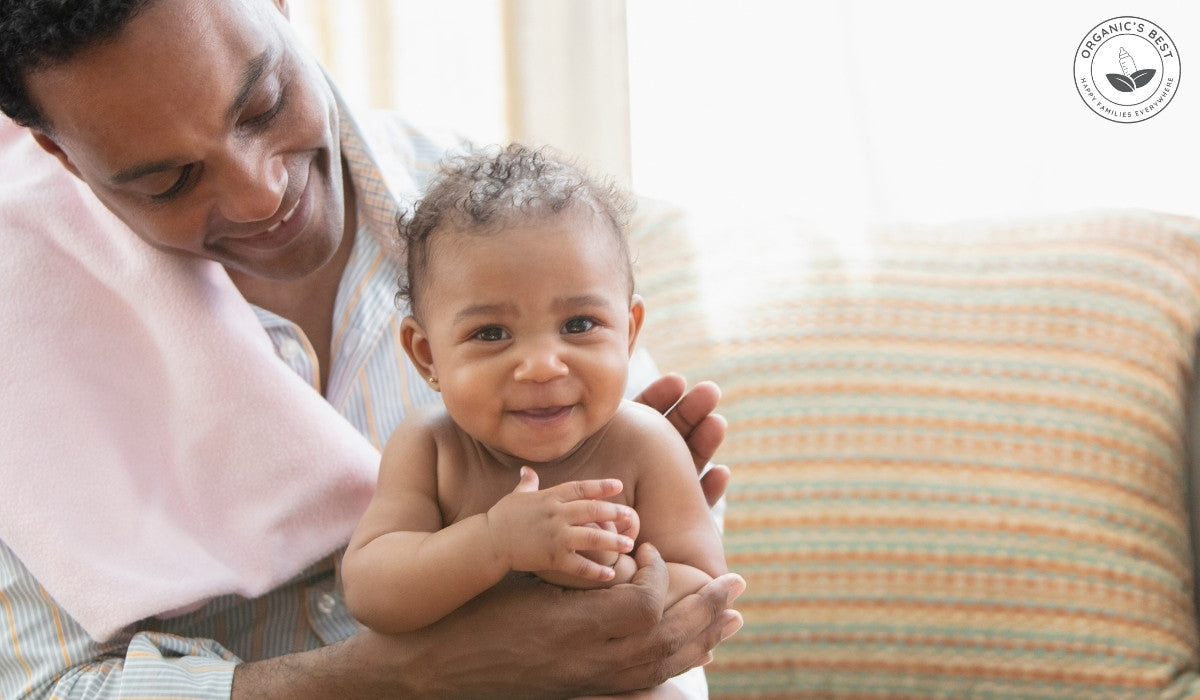Click to Get 2 FREE Boxes/Cans
Click to Get 2 FREE Boxes/Cans
Only New Customers! Click HERE to Get 2 Extra Boxes/Cans for Free With Your First Order.
Only New Customers! Click HERE to Get 2 Extra Boxes/Cans for Free With Your First Order.
BABY FORMULA
Offering new parents top-quality European infant formula from renowned brands like HiPP, Holle, Kendamil, and more. If you’re uncertain about which product to choose, our Formula Finder can help you make the best decision for your baby.
Baby Food
Offering new parents a premium selection of European baby foods, including jars, pouches, cereals, and snacks from esteemed brands like HiPP and Holle.
Why Your Baby Won't Burp and Techniques to Help
by Agustina Fernandez June 20, 2023 7 min read

Babies are born with immature digestive systems, which means during the first three months of life, it is common for them to deal with infantile colic (3 or more hours a day of continued crying) and regurgitation.
This benign condition can be especially worrisome for parents, as it can put your baby in a state of irritability and crankiness. When it becomes difficult to manage, parents often seek medical professionals’ help to manage the symptoms and ease some of their baby’s discomfort.
While burping your little one after feeding is commonly known to expel some of the built-up gas that causes discomfort, we wanted to give you a more in-depth look into why this is the case, signs that your baby needs to burp and what to do if your baby won’t burp.
Table of contents
- Why is Burping Your Baby Useful?
- How Often Should I Burp My Baby?
- Signs That Your Baby Needs to Burp
- Possible Reasons Why Your Baby Won’t Burp
- What Happens When You Can’t Burp Your Baby?
- How to Burp a Baby: Position and Techniques
- How to Burp a Sleeping Baby
- Tips for Preventing Gassiness
- What Age Can I Stop Burping My Baby?
Why is Burping Your Baby Useful?
Burping is a huge part of your baby’s routine because it helps eliminate air bubbles that get trapped from swallowing during feedings. Not only does it ease discomfort, but burping babies also prevents them from spitting up!

Your baby’s body will need some help to burp for the first few months. Whether it’s after a nighttime or daytime feeding, expelling some of that trapped wind can do wonders for relieving gas pain and help to prevent excess gas built up (source).
How Often Should I Burp My Baby?
There is no “one size fits all” answer to this question because each baby is unique. Some babies tend to burp easier than others, and some babies need to be burped during feedings instead of after feeding time.
Their feeding method can also affect how often they should be burped. For example, bottle-fed babies will likely burp more than breastfed babies because bottle-feeding can cause babies to swallow more air bubbles.
There are many factors that can determine how frequently your baby needs to be burped, so make sure to look out for signs to learn what works for your baby.
Signs That Your Baby Needs to Burp
Looking out for behavioural signs can be an excellent way to know when your baby might need a burp break!
Your baby might need to burp if they are...
- Crying
- Arching their back
- Drawing legs into their tummy
- Clenching fists
Possible Reasons Why Your Baby Won’t Burp
If you are attempting to help your baby let out a gas bubble and your baby won’t burp, it is likely due to one of the following reasons:
- Your baby is too tired.
- The gas is trapped: We recommend trying a different position.
- The gas escaped from their rear end.
- They don’t have to: Babies won’t necessarily have to burp after every feeding.
What Happens When You Can’t Burp Your Baby?
New parents have a lot to worry about as it is, but if your baby doesn’t burp, you might wonder if something is wrong or if there are any consequences to not burping.
Here are the answers to some of the most common questions parents ask when their baby isn’t burping.
Can Your Baby Choke if not Burped?
Thankfully, no, your baby will not choke due to not burping. As long as you follow safe sleep practices and your baby is healthy, there should be no risk of choking. Babies have a reflex that allows them to swallow or spit up regurgitated milk, which keeps them from choking.
Is it Okay to Put a Baby to Sleep Without Burping Them?
In short, yes. It’s okay to put a baby to sleep without burping them, and sleepy babies are often so relaxed while feeding that they do not take in too much air. Unless your baby is fussy, restless, or wiggly after waking up, they might not need to burp.
Why are Some Babies Harder to Burp than Others?
All babies are different, and so are their digestive systems. Some bodies learn to expel gas quickly, and other babies really struggle to burp. When a baby struggles to burp, this often leads to colic (source), which means that you may have to find other ways to manage their gas. Luckily, most babies will grow out of colic as their digestive system matures.
Learn More: Best Formula for Colic
How to Burp a Baby: Position and Techniques
Here are 3 of the most common baby burping positions. Remember that burping baby may take some trial and error to see what works best. And here's a pro tip, you can place a burp cloth under your baby’s chin to prevent messy cleanups in case they spit up! 
Over the Shoulder
In this position, you need to rest the baby’s head on your shoulder while holding the baby upright with one hand. Cup your other hand slightly (instead of a flat palm) while patting their back.
Sitting on Your Lap
This position requires you to put your baby in a sitting position on your lap while supporting their chin and chest with one hand. At the same time, rub or gently pat their back with your other hand. This technique works best when using repeated gentle pats on your baby’s back.
Lying Across Your Lap
In this position, start by sitting your baby on your lap, facing away from you while supporting the baby’s chin and jaw. While leaning your baby forward slightly, gently rub or pat their back.
How to Burp a Sleeping Baby
Babies fall asleep while feeding or right after feeding all the time. If this sounds like your baby, you can use slightly different burping methods than the ones listed above.
Shoulder Method
This burping position works especially well for babies who are sound sleepers or when you need to wake your baby for a feeding.
All you have to do is put the baby upright against your upper chest. To help support their body, place one hand under their buttocks and ensure their head is on top of your shoulder. Once they are in this position, gently pat or rub their back between their shoulder blades.
It helps to use an open palm with a consistent, firm, but gentle motion. You can try lightly bouncing them in this position if you are trying to keep them awake.
Chest Method
If you are trying to keep your baby asleep, and the shoulder burp usually wakes them up, you can try this technique instead. Lift the baby to your chest while supporting them with one hand on their back and one under their buttocks.
In this position, you want to avoid stretching the baby’s legs out and instead let them rest in a curled-up position. Begin moving the hand on their back in circular motions, and progress to a gentle pat between their shoulders if rubbing is not enough to help them burp.
Hip Method
This is a great method if you prefer to lie down while burping your baby. Simply place the baby’s tummy over your hip or belly while keeping their head elevated above their body. You can then gently rub or pat their back between the shoulder blades.
Arm Hold Method
This position is especially useful for smaller babies. All you have to do is place your arm under the baby’s back and then carefully turn their body so they are facing belly down, resting on your forearm. Their head should be in the crook of your elbow. You can then gently rub or pat their back between the shoulder blades.
Lap Method
This method can help keep your baby asleep if you are already sitting in a chair or on the couch because it doesn’t require the baby to be upright. To begin, carefully turn the baby onto their tummy while resting them on your thighs.
Use one of your arms to support and raise their upper body by placing it under their chin and chest. You can then gently rub or pat their back between the shoulder blades with the other hand.
Tips for Preventing Gassiness
Preventative measures can be taken to try and reduce your baby’s gas and, ideally, avoid the discomfort associated with gas pains and colic. 
Here are some tips for preventing trapped air bubbles whether you are breastfeeding or bottle-feeding:
- Use special baby bottles intended to reduce swallowed air
- Burp your baby after every half an ounce if you bottle feed
- If you breastfeed, try burping your little one when switching breasts
- Make sure your baby isn’t feeding too fast
- Use bottle nipples with large holes
- Avoid overfeeding or underfeeding
- Feed your baby in an upright position
If breastfeeding, avoid foods that can cause excess gas, like onions, garlic, beans, peas, and spice.
Learn More: What Foods Help to Avoid Gas When Breastfeeding?
What Age Can I Stop Burping My Baby?
Thankfully, babies do not need to be burped forever. Once your baby’s digestive system has matured, they will likely be able to burp without assistance. This usually happens by 4-6 months, but infantile colic and regurgitation are more common in the first three months of life.
Suppose your baby is struggling to burp, or you’ve noticed any signs that could be indicative of a food allergy or intolerance. In that case, we recommend contacting your pediatrician for further advice on how to manage their symptoms.
Conclusion
Parenthood is all about trial and error, which also applies to baby burping. Newborn babies are especially prone to tummy troubles as their immature digestive systems need time to adapt to the sustenance they are given, whether in the form of breast milk, formula, or a combination of the two.
Hopefully, you now have many tools to try if your baby won’t burp or seems to be struggling with excess gas. You do not have to limit yourself to one position or feeding method because combining different techniques sometimes works best! We hope our helpful tips help your baby burp and keep air bubbles at bay!
Disclaimer:
Please be aware that this information is based on general trends in babies, and it is not medical advice. Your doctor should be your first source of information and advice when considering any changes to your child’s formula and when choosing your child’s formula. Always consult your pediatrician before making any decisions about your child’s diet or if you notice any changes in your child. Breastfeeding is the best nutrition for your baby because breast milk provides your child with all the essential nutrients they need for growth and development. Please consult your pediatrician if your child requires supplemental feeding. |
Agustina Fernandez
Dr. Agustina Fernandez earned her medical degree from the prestigious Universidad Nacional de Córdoba, Argentina. With a deep-rooted passion for pediatrics, Dr. Fernandez is currently on the path to specializing in children's healthcare. Recently, she has delved into the vital field of infant nutrition. Her research interests include breastfeeding, infant formula, and baby food in little ones’ formative years. Dr. Fernandez's commitment to this area of study underscores her dedication to ensuring the health and well-being of children from their earliest days.
Leave a comment
Comments will be approved before showing up.
Also in Organic Infant Nutrition and Health Blog

10 Winter Activities for Kids and Toddlers
by Agustina Fernandez January 06, 2026 8 min read
Read More
How to Choose The Best Infant Formula: A Guide to EU Organic Formulas
by Agustina Fernandez January 05, 2026 14 min read
Read More
Best Formula for Breastfed Babies 2026 Guide
by Agustina Fernandez January 05, 2026 15 min read
Read More
Reviewed by Dr. Po-Chang Hsu, MD, MS
-

Dr. Po-Chang Hsu: Medical Reviewer of Organic's Best Blog
Dr. Hsu received his medical degree from Tufts University in Boston, Massachusetts, and holds a Master’s of Science degree from both Harvard University and Tufts University.
